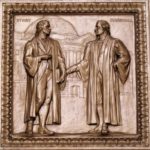In this lesson, students will learn about the actions of John Marshall concerning the Cherokee nation. They will explore how his actions helped to advance justice and, through his example, learn how they can advance justice in their own lives.
John Marshall, Marbury v. Madison and Judicial Review—How the Court Became Supreme

If James Madison was the “father” of the Constitution” John Marshall was the “father of the Supreme Court”—almost single-handedly clarifying its powers. This new lesson is designed to help students understand Marshall’s brilliant strategy in issuing his decision on Marbury v. Madison, the significance of the concept of judicial review, and the language of this watershed case.
The Supremacy Clause
Tension between the states and the federal government has been a constant throughout U.S. history. This video explores the supremacy clause in Article VI of the Constitution and key moments in the power struggle, including the landmark case McCulloch v. Maryland. In McCulloch, Chief Justice John Marshall wrote that the supremacy clause unequivocally states that the “Constitution, and the Laws of the United States … shall be the supreme Law of the Land.”
The Origin, Nature and Importance of the Supreme Court
Chief Justice John G. Roberts Jr. and high school students discuss the Supreme Court: its history and traditions, how it selects and decides cases, and the role of an independent judiciary. A lesson guide accompanies the video.
Marbury v. Madison
In this lesson, students will view video clips explaining the Supreme Court case Marbury v. Madison. Students will analyze the significance of the case, the precedent it set and its legacy.